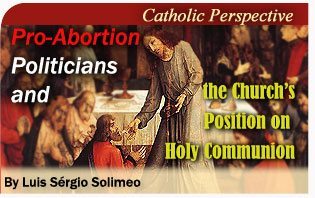
Nothing is more sacred for a Catholic than the Holy Eucharist.
The Church teaches that “Holy Communion is the reception of the Body and Blood of Jesus Christ, really and substantially present under the consecrated species, offered as a sacrifice to God in Holy Mass.”1
Thus, any insult to the Eucharist is something that concerns all Catholics, particularly when someone receives Holy Communion to challenge Church laws or show great disrespect.
Outrages to the Holy Eucharist
Unfortunately, such public challenges and grave disrespect to the Blessed Sacrament are happening ever more frequently.
This could be seen in the case last year when two homosexuals, cross-dressing as nuns, received Holy Communion from Archbishop Niederauer of San Francisco.
A more recent case was the sacrilegious exposition at Vienna’s diocesan museum. Catholics were horrified to see a painting depicting the Last Supper, where Our Lord instituted the Holy Eucharist, as a homosexual orgy. Other offensive painting will remain until May 10.2
Finally, there was the media-announced and actual receiving of Holy Communion during the recent Papal Masses by prominent politicians publicly opposed to Catholic doctrine on abortion.
A Calculated Challenge to Church Laws
Such scandalous actions appear to be a calculated challenge to Church laws. To make matters worse, House Speaker Nancy Pelosi was quoted in the media defining the Holy Eucharist in a way that does not reflect Church teaching.
“Communion is the body of the people of the church coming together,” Pelosi said at her weekly news conference after returning from the Papal Mass. “I feel very much a part of that.”3
National Catholic Reporter writer John Allen noted that the politicians had publicly manifested their intention of receiving Holy Communion at the Papal Masses and no measure was taken to prevent them from doing so. The result, he argued, is a de facto weakening of the position of those American bishops who affirm the incompatibility between these politicians’ pro-abortion stance and their receiving Holy Communion.4
Catholic Doctrine Cannot Change
Without denying the negative consequences of these politicians’ acts, it must be noted that — regardless of Mr. Allen’s opinion to the contrary — the doctrinal position of the bishops opposed to giving Holy Communion to pro-abortionists remains entirely solid, since it is based on immutable moral principles.
Furthermore, when still Prefect for the Congregation for the Doctrine of the Faith, in a memorandum dated July 3, 2004 to the American bishops gathered in Denver, Colorado for their semi-annual meeting, Joseph Cardinal Ratzinger clearly recalled these principles.
After explaining that to receive Holy Communion one must be in the state of grace and observe the Eucharistic fast, he adds the following points:
• “The Church teaches that abortion or euthanasia is a grave sin. […] Christians have a “grave obligation of conscience not to cooperate formally in practices which, even if permitted by civil legislation, are contrary to God’s law. Indeed, from the moral standpoint, it is never licit to cooperate formally in evil. […]”
• “Apart from an individual’s judgment about his worthiness to present himself to receive the Holy Eucharist, the minister of Holy Communion may find himself in the situation where he must refuse to distribute Holy Communion to someone, such as in cases of a declared excommunication, a declared interdict, or an obstinate persistence in manifest grave sin (cf. can. 915).”
Eternal and Natural Law: The Foundation of Morals and Law
• “Regarding the grave sin of abortion or euthanasia, when a person’s formal cooperation becomes manifest (understood, in the case of a Catholic politician, as his consistently campaigning and voting for permissive abortion and euthanasia laws), his Pastor should meet with him, instructing him about the Church’s teaching, informing him that he is not to present himself for Holy Communion until he brings to an end the objective situation of sin, and warning him that he will otherwise be denied the Eucharist.
• When “these precautionary measures have not had their effect or in which they were not possible,” and the person in question, with obstinate persistence, still presents himself to receive the Holy Eucharist, “the minister of Holy Communion must refuse to distribute it” (cf. Pontifical Council for Legislative Texts Declaration “Holy Communion and Divorced, Civilly Remarried Catholics” [2000], nos. 3-4). This decision, properly speaking, is not a sanction or a penalty. Nor is the minister of Holy Communion passing judgment on the person’s subjective guilt, but rather is reacting to the person’s public unworthiness to receive Holy Communion due to an objective situation of sin.”5
Thus, the rules are very clear. Contrary to media reports, the politicians’ challenge will continue to be met by the twenty or so bishops who have courageously manifested their position on this matter, especially Archbishop Raymond Burke of St. Louis and Bishop Michael J. Sheridan of Colorado Springs. On the part of the politicians, it seems strange that politicians who one would think want to attract the Catholic vote this election year would choose to show such public disrespect for that which the Church holds most sacred.
Footnotes
- Dom Gregory Manise, O.S.B, Communion, Holy, in Francesco Cardinal Roberti-Monsignor Pietro Plazzini, Dictionary of Moral Theology, The Newman Press, Westminster, Maryland, 1962, pp. 259-260.
- Cf. Luiz Sérgio Solimeo, “Sacrilege, Scandal and Homosexual Ideology in San Francisco,” https://tfp.org/index.php?option=com_content&task=view&id=551&Itemid=73; “Protest a Lewd Homosexual Blasphemy at Vienna’s Diocesan Museum,” March 28, 2008, https://tfp.org/cc/index.php?option=com_content&task=view&id=793&Itemid=50; infra note 3.
- Mike Soraghan, Pelosi takes Communion at papal Mass, http://thehill.com/leading-the-news/pelosi-takes-communion-at-papal-mass-2008-04-17.html.
- John L Allen Jr., “No hard line from pope on communion for pro-choice pols,” National Catholic Reporter, Apr 20 2008, http://ncrcafe.org/node/1749.
- Cf. Worthiness to Receive Holy Communion. General Principles, by Joseph Ratzinger, http://chiesa.espresso.repubblica.it/articolo/7055?eng=y.
